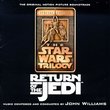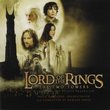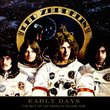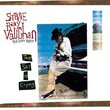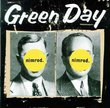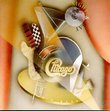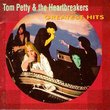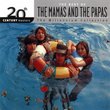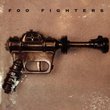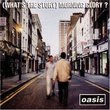| All Artists: John Williams, London Symphony Orchestra Title: The Empire Strikes Back: The Original Motion Picture Soundtrack (Special Edition) Members Wishing: 1 Total Copies: 0 Label: RCA Original Release Date: 5/21/1980 Re-Release Date: 8/26/1997 Album Type: Soundtrack Genres: Pop, Soundtracks Style: Number of Discs: 2 SwapaCD Credits: 2 Other Editions: The Empire Strikes Back: The Original Motion Picture Soundtrack (Special Edition) UPCs: 090266877324, 090266877348 |
Search - John Williams, London Symphony Orchestra :: The Empire Strikes Back: The Original Motion Picture Soundtrack (Special Edition)
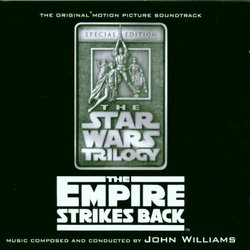 | John Williams, London Symphony Orchestra The Empire Strikes Back: The Original Motion Picture Soundtrack (Special Edition) Genres: Pop, Soundtracks
By the end of the 1970s, John Williams was already a legend among filmmakers and film-scoring buffs. But the success of Star Wars elevated him to something he probably could have scarcely imagined--bona fide pop-culture ic... more » |
Larger Image |
CD DetailsSynopsis
Amazon.com essential recording By the end of the 1970s, John Williams was already a legend among filmmakers and film-scoring buffs. But the success of Star Wars elevated him to something he probably could have scarcely imagined--bona fide pop-culture icon. Williams's masterful score to the first Star Wars sequel (and the chapter many sci-fi fans cite as the series' most dark, emotionally complex, and satisfying) fleshes out his original character themes with some new ones while painting compelling musical portraits of alien worlds as disparate as the ice planet Hoth and the swampy Dagobah. Notable are the menacing, Prokofiev-inspired "Imperial Theme (Darth Vader's March)"; the noble "Yoda and the Force"; and Hoth's "Battle" cues, which are some of the most dramatic action cues ever. This expanded edition also fleshes out the already familiar themes with new tracks that restore the score to its status as a grand galactic symphony. A richly illustrated booklet is included as well, helping listeners place each piece of music in its proper cinematic context. Of his four attempts at coloring George Lucas's rich stellar saga, this remains Williams's most consistent and compelling. --Jerry McCulley Similarly Requested CDs
|
CD ReviewsJohn Williams Strikes Back Alex Diaz-Granados | Miami, FL United States | 05/10/2003 (5 out of 5 stars) "With the phenomenal success of the Star Wars soundtrack album in the late 1970s, John Williams had a tough task ahead: how to compose a score that would not only build upon the existing musical material, but also create new material that would stand on its own? Both George Lucas and Williams had this burden -- the film had to fulfill fans' expectations and be good on its own, lest it fall into the " pale carbon copy of the first film" category (a fate which the Jaws franchise could not avoid) common in Hollywood.As it turned out, both the movie and score were excellent. Episode V (as the movie is now part of a six-chapter series) is considered to be the best chapter in the Classic Trilogy...some fans even say it is the best of the series. And of course, the score introduced several major new themes, the most popular being The Imperial March (Darth Vader's Theme).The 1997 Special Edition version of the musical score is the definitive soundtrack album. Like the other two 2-disc sets from the Classic Trilogy, RCA/Victor's The Empire Strikes Back soundtrack presents every musical "cue" (including Alfred Newman's 20th Century Fox fanfare and several tracks [Aboard Executor, plus the concert arrangements of Darth Vader's Theme and Yoda's Theme]not used in the film) in chronological order. The 1980 2-LP album (like its 1977 predecessor) spliced unrelated cues and did not attempt to present the music sequentially. Neither did Polydor's bargain priced CD re-release of the early 1990s; not only did that awful version contain less than half of the vinyl release, but it presented the tracks in such a way that the Star Wars (Main Title) theme was LAST! The Star Wars Trilogy Soundtrack Anthology, a 4-disc boxed set, did much to remedy the quality of this score's CD version, restoring the entire 2-LP album's content and adding unreleased material. But for purists and film score fans, this version is unrivaled for completeness and presentation.This 2-CD set is expensive, but it comes with a nice slipcover type CD case and a booklet of track-by-track liner notes, illustrated with stills from the film. The CDs themselves are silver with lasered art (the Empire's seal is embossed on the top). If price is a concern, there is a less expensive edition available." The Empire Strikes Back...A true masterpiece. Joseph Payne | 10/04/2000 (5 out of 5 stars) "The Empire Strikes Back. As many people know, Star Wars has been known as one of the most successful soundtracks ever made. The Star Wars trilogy would not be the same if it weren't for the incredible efforts John Williams put into writing music that would bring out the movie so well. Of all the Star Wars movies made, the Empire Strikes Back probably has the best soundtrack of them all. John Williams shows his genius in writing complex music in tracks such as the well-known "Asteroid field" and the "ImperialMarch." The music from this soundtrack will often have you listening in awe, wondering how composers can write such awesomeand inspiring music. Every Star Wars soundtrack that has been made starts with the main theme, which is accurate to the opening of the movies. The first real exciting track, "the Battle of Hoth" has you standing on your toes, never ceasing to bring a suprise around the corner. Although the music starts quietly, it is quickly interrupted by the Imperial theme. At this point, it is easy to picture yourself looking through a pair of binoculars, straight into the face of an AT-AT walker. This music is constantly tense, and many parts are similar to fragments of the soundtrack, "Medal of Honor." John Williams even uses low piano chords in some parts during the Battle of Hoth, and shrilling high strings that clearly depict the mighty strength of the Imperial walkers. The music continues much the same for 14 exciting minutes, never ceasing to give you a chill down the spine every now and then. The next track, popular and sometimes tense, the "Asteroid field" starts with the Imperial March, giving you memories of the Rebellion's defeat on the planet Hoth. Strings continue to play up and down the scales, (WAY up the scales at one point or another) till the actual theme from the asteroid field begins, using a terribly complex mix of strings and brass. Eventually, when the music reaches it's high point, is breaks into a glorious sounding theme, which has me dumb-founded every time I hear it. (I think the asteroid field is the best music from any of the Star Wars videos yet made) It ends with the "love theme" after the music finally quiets down. Disc 2 has a fascinating introduction,where Darth Vador's theme is played. (better known as the Imperial March) Even if the music is intended to depict the dark side, its brassy theme will never cease to amaze you. (How come the bad guys always have the good music!?) It begins with strings and drums in the background, giving you the march beat. Brass then join in as the lead instruments, going up and down the scales constantly, bringing back memories of the asteroid field. In the middle of the music, it quiets down, then the Imperial theme is echoed while strings play in the background, giving the music that space-sounding style. The music then leads back to the loud and brassy Imperial March, which sounds much the same as the track began. It ends with a superb grand finally, making you think of the massive power of the evil Empire. Yoda's theme is much like Leia's theme, quiet and slow. (which is not often heard on this soundtrack. This point in the CD is really just a break to the more tense-sounding music to come) Track 3, "Attacking a Star Destroyer" is much the same as the Battle of Hoth, which always contains that fierce and tense battle sound. This track and track 5 are very similar in style, only track 5 has the Imperial March played often in the music. The last track on disc 2 is a peaceful track that is accompanied by Obi Wan's theme and a harp in the background, where it continues to play 'til it blends into the end titles, which contains fragments of much of the music previously heard throughout the soundtrack. This track provides a great ending to the exciting music of the Empire Striles Back. Definitely being in John William's top five best compositions, I highly recommend getting this soundtrack. Perfect for whatever mood you're in. After getting this soundtrack, you'll agree on the five star rating." Reminicent of past epic scores. sets tone for a great film. BRIANB@NETWORKACI.NET | Seattle, Washington | 02/02/1999 (5 out of 5 stars) "John Williams is a one of a kind genius. His "Star Wars" music is as good as film scoring gets, and "The Empire Strikes Back" score is the most memorable in the trilogy. Like the film itself it takes the audience all over the galaxy. Yoda's theme is a piece that pesonifided the charater. It starts off slowly with a mystical quality, which reflects Yoda's appearence, then it erupts into a large, full orchestra piece that reflects Yoda's beliefs and abilities. The theme that is immediately recognizable is the "Imperial march". With the exception of the main "Star Wars" theme it is the most memorable in the trilogy, mainly because it symbolized the dark mood of the film. That film wasn't too easy on the good guys, and that music did a great job of expressing the insurmountable evil that they were up against. The music of John Williams gives a contemporary film a nostalgic feel. Not only are his scores unforgettable, but in many cases they are the anchor of the film, the most important element. This,I feel,is true of his "Empire" score to say the very least."
|

 Track Listings (11) - Disc #1
Track Listings (11) - Disc #1